United States

New issue of Monthly Review! If there is one thing that is clear about the economic situation in the mature capitalist economies, as we write these notes in mid-August 2019, it is that the financial world is increasingly running scared and looking for safe havens, worrying about the storm clouds ahead. There is now little doubt that the world economy is on the verge of a recession after a long sluggish recovery from the Great Financial Crisis of 2007-09. In itself this should not give occasion to surprise. In this instance, however, there lurks a bigger fear, the possibility of a financial Armageddon on the level of the Great Financial Crisis of 2008—or worse. | more…

A new poem by Kenneth Salzmann, author of The Last Jazz and Other Poems. | more…

Margaret Benston and the Political Economy of Women's Liberation
In the late 1960s, the North American women’s liberation movement was reaching a highpoint of activity, its militancy complemented by a flourishing literature. This was the environment into which Margaret Benston’s 1969 Monthly Review essay, “The Political Economy of Women’s Liberation,” struck like a lightning bolt. At the time, many in the movement were describing women’s situation in terms of sociological roles, functions, and structures—reproduction, socialization, psychology, sexuality, and the like. In contrast, Benston proposed an analysis in Marxist terms of women’s unpaid labor in the family household. In this way, she definitively shifted the framework for discussion of women’s oppression onto the terrain of Marxist political economy. | more…
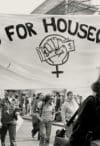
The Political Economy of Women's Liberation
Margaret Benston’s “The Political Economy of Women’s Liberation” appears as both a return to the past and, at the same time, if not a “watershed,” as described by Peter Custers, certainly a new turn. On the one hand, she reiterated the classic Marxist-Leninist argument concerning the precapitalist, premarket character of domestic work. On the other, she so strongly insisted on the importance of this work for the stability and perpetuation of the capitalist system that she not only anticipated some of the theses later argued by theorists in the Wages for Housework Campaign, but often fell into apparent contradictions. | more…

Gender is not just about women; it is about the social relationship between men and women and the dialectical, reciprocal, and cultural construction of femininity and masculinity. Recognition of a unique historical experience concerning gender informs the perspectives of African Americans of various political persuasions. This history incorporates a land of origin with certain common principles about gender and family. It also encompasses the African-American experience in the United States where the denial of many “protections” offered by gender roles and indeed sometimes inversion of such roles was a means of maintaining control. Hence asserting the right to assume gender-based roles of husband, father, wife, and mother paradoxically was an act of resistance. The manner in which African-American people have envisioned relationships of gender in light of that history has expressed itself in markedly different forms. | more…

Marge Piercy is the author of many books of poetry, most recently Made in Detroit. | more…
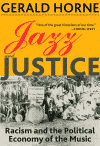
The music we call “jazz” arose in late nineteenth century North America—most likely in New Orleans—based on the musical traditions of Africans, newly freed from slavery. Grounded in the music known as the “blues,” which expressed the pain, sufferings, and hopes of Black folk then pulverized by Jim Crow, this new music entered the world via the instruments that had been abandoned by departing military bands after the Civil War. Gerald Horne’s Jazz and Justice: Racism and the Political Economy of the Music examines the economic, social, and political forces that shaped this music into a phenomenal U.S.—and Black American—contribution to global arts and culture. | more…
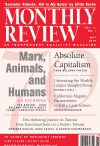
Monthly Review is now seventy years old, with its first issue appearing in May 1949. In this month’s issue, the editors reflect on the legacy of MR, the people who built it, and the ones who keep it going today. | more…
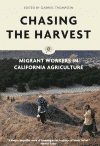
A Caste System Enforced by State Power
“No one comes out here. No one knows what we go through,” Roberto Valdez, a farmworker in the Coachella Valley town of Thermal, California, tells Gabriel Thompson, the interviewer and editor of Chasing the Harvest, a recently published book of interviews with farmworkers, growers, union activists, teachers, and others. And as one reads through the compelling stories that are told in the collection, one gets a deep sense of what Roberto means, as well as a passionate urge to have others know of the life and work of those who labor in California’s fields. | more…

Capitalism has many victims, but few fare as badly as slaughterhouse workers. Every day, meatpacking workers risk life and limb to provide cheap meat for consumers. Despite this, political scientist Timothy Pachirat once described slaughterhouse work as a form of labor “considered morally and physically repellent by the vast majority of society that is sequestered from view rather than eliminated or transformed.” Yet, slaughterhouses are the sites of some of labor’s greatest triumphs. Lynn Waltz documents one such triumph in her book Hog Wild, which describes how meatpacking workers successfully established a union at the Tar Heel slaughterhouse in North Carolina. While Waltz focuses on the particular fight at the Tar Heel plant, the unionization success of the workers there provides important lessons for future labor struggles. | more…
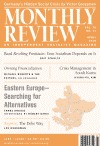
In the midst of the U.S.-directed coup attempt against the Bolivarian Republic of Venezuela in January–February, Donald Trump delivered a number of verbal attacks on socialism in Venezuela, Cuba, and Nicaragua. The immediate object was to justify U.S. attempts to overthrow the Bolivarian Republic. The less immediate, but hardly less important, goal was to tarnish the growing social democratic (self-styled democratic socialist) movement in the United States, associated with figures like Bernie Sanders and Alexandria Ocasio-Cortez. In order to safeguard their ambitious social-reform program, the new coterie of Democratic Party socialists have thus sought to separate themselves from Venezuela and other Latin American socialist states, presumably abandoning these countries to their fates at the hands of U.S. imperialism. This raises the historic question of social imperialism—a policy of social reform at home and imperial hegemony abroad. | more…

This reprise of “The Debs Way”—the text of an address Leo Huberman delivered at the Debs Centennial Meeting held at the Fraternal Clubhouse in New York City on November 28, 1955—not only reminds us of the importance of Eugene V. Debs to the history of socialism in the United States, but also brings out some of the core beliefs of Huberman’s own approach to socialism. While today’s conditions are of course vastly different from when the address was delivered more than sixty years ago, the basic principles that Huberman derives from Debs remain relevant.











